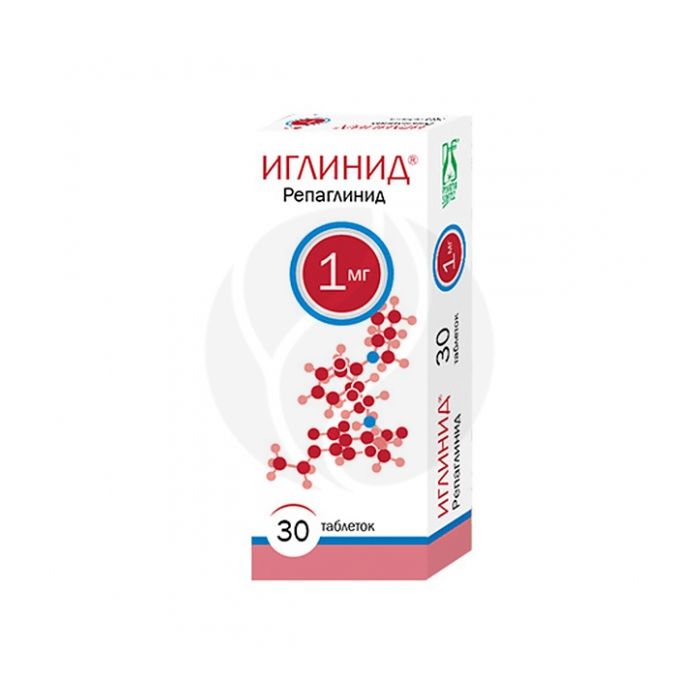Iglinide tablets 1mg, No. 30
Russian Pharmacy name:
Иглинид таблетки 1мг, №30
The dosage regimen is set individually, adjusting the dose in order to optimize the glucose level. The recommended starting dose is 500 mcg. An increase in the dose should be carried out no earlier than after 1-2 weeks of constant intake, depending on laboratory parameters of carbohydrate metabolism. Maximum doses: single - 4 mg, daily - 16 mg. After using another hypoglycemic drug, the recommended initial dose is 1 mg. every main meal. The optimal time for taking the drug is 15 minutes before a meal, but it can be taken 30 minutes before a meal or immediately before a meal.
Tablets are white or almost white, round, flat-cylindrical, with a bevel.
1 tab. repaglinide
Excipients: povidone K30, sodium carboxymethyl starch, anhydrous calcium hydrogen phosphate, microcrystalline cellulose (200), LH-21 hyprolose, sodium dihydrogen phosphate, polysorbate 20, poloxamer 407, sodium stearyl fumarate, colloidal silicon dioxide.
Type 1 diabetes mellitus (insulin dependent),
diabetic ketoacidosis (including with a coma),
severe renal dysfunction,
severe liver dysfunction,
concomitant drug treatment,
inhibiting or inducing CYP3A4,
pregnancy (including planned),
lactation,
hypersensitivity to repaglinide.
pharmachologic effect
Oral hypoglycemic agent. Rapidly lowers blood glucose levels by stimulating the release of insulin from functioning ? cells in the pancreas. The mechanism of action is associated with the ability to block ATP-dependent channels in the membranes of ?-cells by acting on specific receptors, which leads to cell depolarization and the opening of calcium channels. As a result, an increased influx of calcium induces the secretion of insulin by ? cells.
After taking repaglinide, the insulinotropic response to food intake is observed within 30 minutes, which leads to a decrease in blood glucose levels. There is no increase in insulin concentration between meals. In patients with type 2 diabetes mellitus (non-insulin dependent), when taking repaglinide in doses from 500 ?g to 4 mg, there is a dose-dependent decrease in blood glucose levels.
Pharmacokinetics
After oral administration, repaglinide is rapidly absorbed from the gastrointestinal tract, while Cmax is reached 1 hour after administration, then the level of repaglinide in plasma decreases rapidly and becomes very low after 4 hours. There were no clinically significant differences in the pharmacokinetic parameters of repaglinide when taken immediately before meals, 15 and 30 minutes before meals or on an empty stomach.
Plasma protein binding is more than 90%.
Vd is 30 L (which is consistent with the distribution in the intercellular fluid).
Repaglinide is almost completely biotransformed in the liver to form inactive metabolites. Repaglinide and its metabolites are excreted mainly with bile, less than 8% - with urine (in the form of metabolites), less than 1% - with feces (unchanged). T1 / 2 is about 1 hour.
Side effect
From the side of metabolism: effect on carbohydrate metabolism - hypoglycemic conditions (pallor, increased sweating, palpitations, sleep disorders, tremors); fluctuations in blood glucose levels can cause temporary disturbances in visual acuity, especially at the beginning of treatment (it was noted in a small number of patients and did not require discontinuation of the drug).
From the digestive system: abdominal pain, diarrhea, nausea, vomiting, constipation; in some cases - an increase in the activity of liver enzymes.
Allergic reactions: itching, erythema, urticaria.
Application during pregnancy and lactation
Use during pregnancy and lactation is contraindicated.
In experimental studies, it was found that there is no teratogenic effect; however, when used in high doses in rats at the last stage of pregnancy, embryotoxicity, impaired development of the limbs in the fetus, was observed. Repaglinide is excreted in breast milk.
Application for violations of liver function
Contraindicated in severe liver dysfunction.
Application for impaired renal function
Contraindicated in severe renal impairment.
special instructions
With liver or kidney disease, major surgical interventions, a recent illness or infection, the effectiveness of repaglinide may decrease.
Use with caution in patients with kidney disease.
In debilitated patients or in patients with reduced nutrition, repaglinide should be taken in the minimum initial and maintenance doses. To prevent hypoglycemic reactions in this category of patients, the dose should be selected with caution.
The resulting hypoglycemic conditions are usually moderate reactions and are easily stopped by the intake of carbohydrates. In severe conditions, it may be necessary to administer intravenous glucose. The likelihood of developing such reactions depends on the dose, nutritional characteristics, intensity of physical activity, stress.
It should be borne in mind that beta-blockers can mask the symptoms of hypoglycemia.
During the period of treatment, patients should refrain from drinking alcohol, because ethanol can enhance and prolong the hypoglycemic effect of repaglinide.
Influence on the ability to drive vehicles and use mechanisms
Against the background of the use of repaglinide, the advisability of driving a car or engaging in other potentially hazardous activities should be assessed.
Drug interactions
An increase in the hypoglycemic effect of repaglinide is possible with the simultaneous use of MAO inhibitors, non-selective beta-blockers, ACE inhibitors, salicylates, NSAIDs, octreotide, anabolic steroids, ethanol.
A decrease in the hypoglycemic effect of repaglinide is possible with the simultaneous use of hormonal contraceptives for oral administration, thiazide diuretics, GCS, danazol, thyroid hormones, sympathomimetics (when prescribing or canceling these drugs, it is necessary to carefully monitor the state of carbohydrate metabolism).
With the simultaneous use of repaglinide with drugs that are mainly excreted in the bile, the possibility of a potential interaction between them should be considered.
Pharmacokinetic interaction
In connection with the available data on the metabolism of repaglinide by the CYP3A4 isoenzyme, possible interaction with CYP3A4 inhibitors (ketoconazole, intraconazole, erythromycin, fluconazole, mibefradil), leading to an increase in the level of repaglinide in plasma, should be taken into account. CYP3A4 inducers (including rifampicin, phenytoin) can reduce the plasma concentration of repaglinide. Since the degree of induction has not been established, the simultaneous use of repaglinide with these drugs is contraindicated.

